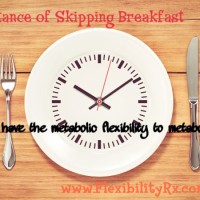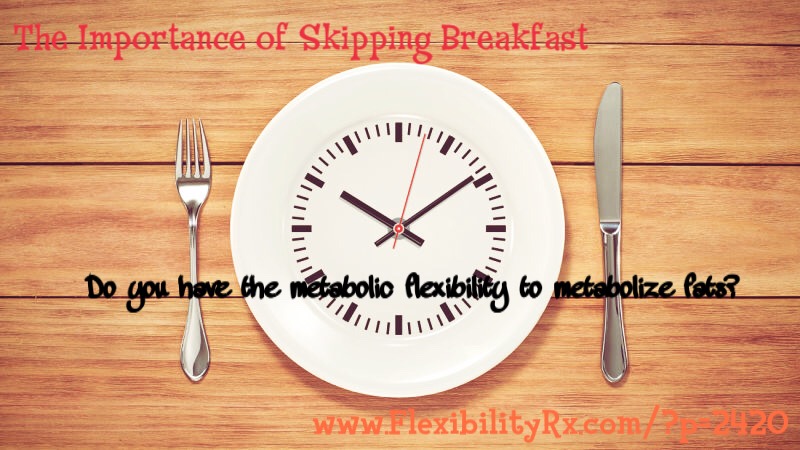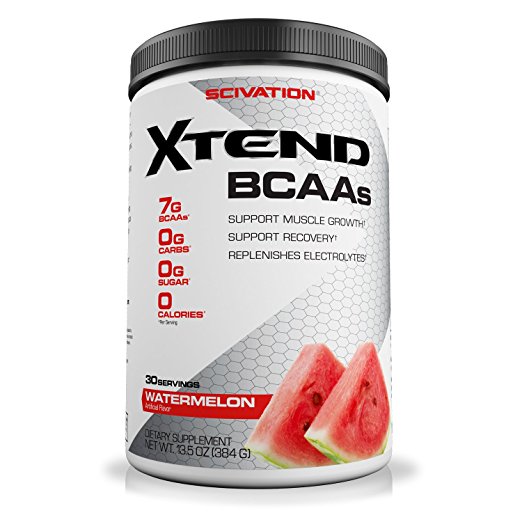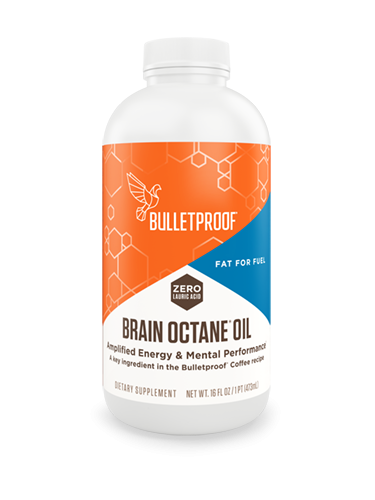
The Importance of Skipping Breakfast
While there is nothing wrong with eating some eggs for breakfast (eggs are pretty much a perfect food) there are many benefits to skipping breakfast entirely.
We have been ‘force fed’ the notion that bad things will happen to us if we skip breakfast. A lot of this propaganda has been from makers of high carbohydrate breakfast food companies such as General Mills.
While some individuals may find success with a high fat, adequate protein, low carbohydrate breakfast (that improves insulin sensitivity, minimizes free radical damage and inflammation) let’s discuss the potential benefits of eating your first meal at 12 or 2pm.
Intermittent Fasting revolves around a compressed feeding window (Generally all food for the day is eaten within an eight-hour window). This would mean that if lunch is at 12pm you would stop eating at 8pm. This 8-hour feeding window would create a 16 hour fast.
Skipping breakfast is one of the best ways to integrate Intermittent Fasting into your daily routine. Intermittent fasting helps the body become adapted to using ketones (fat) as a primary fuel source instead of glucose (sugar).
“To be effective, in the case of daily intermittent fasting, the length of your fast must be at least 16 hours. Essentially, this equates to simply skipping breakfast, and making lunch your first meal of the day instead.” – Dr. Joseph Mercola
While some (Brad Pilon of Eat Stop Eat) advocate a weekly 24 hour fast (a lunch-to-lunch or dinner-to-dinner fast), a 16-18 hour fast can easily be done daily or a few times a week.
Individuals that have less flexible schedules can eat dinner earlier if they need to take an earlier lunch or vice versa. Martin Berkhan of LeanGains advocates a daily 16 hour fast, providing a few different strategies toward fasting.
Check out this post on 10 misconceptions about fasting courtesy of LeanGains:
There has been some talk of skipping breakfast leading to overeating and poor choices made later in the day. Dr. Mercola and others point out that it is important to first improve food quality before considering skipping meals. In fact, his MMT Diet protocol uses a ketogenic version of a Paleo diet with intermittent fasting to eventually optimize someone’s health (see his essential book, “Fat for Fuel”)
If we consider daily fasting as a tool to increase insulin sensitivity and shift our energy supply from glucose to ketones then we actually will reduce our cravings and can go longer periods without eating. It is this improved ability to burn fat that makes daily fasting a very implementable tool for fat loss, cancer prevention, and immune system regeneration.
“It takes about six to eight hours for your body to metabolize your glycogen stores; after that you start to shift to burning fat. However, if you are replenishing your glycogen by eating every eight hours (or sooner), you make it far more difficult for your body to use your fat stores as fuel.” – Dr. Joseph Mercola
The terms Intermittent Fasting and Ketogenic Diet often appear in the same context. This is because both carbohydrate restriction and caloric restriction (via a compressed feeding window) both enable usage of fat as a fuel. Someone who has a busy afternoon can still benefit from this style of eating by having eggs for breakfast and then having an early dinner.
The nice part about a 16-18 hour fast is that your 8 hours of sleep fills the bulk of your fasting period.
Contraindications
Hypoglycemic individuals should first focus on food quality – implementing Paleo Diet for a few weeks for example (that is under 150 grams of carbohydrates a day instead of below 50). Individuals with adrenal fatigue or that do not get enough sleep should also refrain from fasting and instead just focus on food quality. Pregnant or nursing mothers should avoid fasting to encourage adequate nutrient intake for the baby.
I, and many other fitness practitioners and entrepreneurs that I have talked to find that skipping breakfast allows for a very productive morning. Once someone is adapted to using ketones for fuel (burning fat instead of sugar) getting work done in the morning is much easier without having to digest food.
Mantak Chia in his book, “The Art of Cosmic Vision” points out, “Reading and close work during and after meals impair the eyesight because digestion draws blood to the digestive system, thus causing lack of nutrients to the eyes, weak eye muscles, and cloudy vision.”
For individuals who work out in the morning Martin Berkhan has this recommendation:
“Here’s a sample setup for a client that trains early in the morning and prefers the feeding phase at noon or later.
6 AM: 5-15 minutes pre-workout: 10 g Branch Chain Amino Acids.
6-7 AM: Training.
8 AM: 10 g BCAA.
10 AM: 10 g BCAA
12-1 PM: The “real” post-workout meal (largest meal of the day). Start of the 8 hour feeding-window.
8-9 PM: Last meal before the fast.”
One entry point into fasting is having a Bulletproof Coffee in the morning which consists of coffee blended with non-salted grass-fed butter and MCT Oil. Medium Chain Triglyceride oil is a type of fat that is a great fuel source and enhances cognitive function. The fat would cut into your feeding window but this can be a good introduction into longer periods without eating as it does provide some calories.
Another tool to combat hunger is to drink sparkling mineral water during your fasting window.
Try skipping breakfast a few times a week and observe how your energy, productivity, and physique improve.
– Kevin J. Kula, “The Flexibility Coach”
Resources
https://fitness.mercola.com/sites/fitness/archive/2014/06/20/eating-breakfast-intermittent-fasting.aspx
https://fitness.mercola.com/sites/fitness/archive/2012/05/04/fasting-effects-on-human-growth-hormone.aspx
https://fitness.mercola.com/sites/fitness/archive/2013/06/28/intermittent-fasting-health-benefits.aspx
https://leangains.com/early-morning-fasted-training/
https://leangains.com/the-leangains-guide/
http://bradpilon.com
https://robbwolf.com/2008/01/02/sleepintermittent-fasting/




Leave A Reply (No comments so far)
You must be logged in to post a comment.
No comments yet